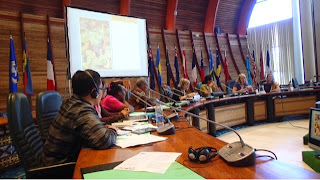The 40th annual conference of the International Association of Aquatic and Marine Science Libraries and Information Centers was hosted by the Secretariat of the Pacific Community in Noumea, New Caledonia. (September 14-18, 2014). That is a long ways from Newport and I got there via New Zealand.
The SPC was founded in 1947 to assist the Pacific Island Region stabilize after WWII. It works across many sectors to achieve economic growth, sustainable natural resource management and utilization, and healthy human and social development. Members include the 22 island states and territories plus four of the original founders – New Zealand, USA, France and Australia. The headquarters has a lovely meeting hall that is shaped like an upside-down canoe. We met here and the picture below gives you an idea of the grandeur of the setting.

For a more detailed daily description of the conference, my colleague, Kris Anderson from the University of Hawaii, blogged the meeting. She has a readable and enjoyable style that gives you a flavor for the meeting.
Here are a few of the things I learned or impressed me the most.
- The Pacific Islands Region is vast – 5000 km x 10000km. There are over 9000 islands. Travel is difficult with few island to island flights. 1% of the islands have reliable internet connections. 13 of the 22 capitals of the state and territories have cabled connections; the rest are via satellite. This makes communication challenging and delivery of information formidable.
- SPC has the Fisheries, Aquaculture and Marine Ecosystems (FAME) Digital Library. The Pacific Islands Marine Portal (PIMRIS) adds records from the region to the Aquatic Science and Fisheries Abstracts and the Aquatic Commons. The resources are impressive and unique but both organizations are challenged by staff turnover (when people are trained in IT they tend to move on from the libraries), inconsistent internet access, very limited budgets and professional capacity. Collaboration is not just nice – it’s essential.
- Conservation of the ocean is part of the DNA of Pacific Islanders.
- Library Box offers a possible solution to limited internet access and inconsistent electricity. Steve Watkins from CSUMB demonstrated this digital distribution tool that uses a solar powered, battery operated portable wireless router to serve out content. In this case, he downloaded the contents of Aquatic Commons on the flash drive. Two of the devices are now being tested at IAMSLIC member institutions in the Pacific Islands Region.
- The Vietnam Institute of Oceanography finally has plans to set up a rare book room to protect its valuable collection from the vagaries of high humidity and temperature. The staff has started digitizing items in the collection to save them from continued use in the labs by staff needing taxonomic verification. The Institute has digitized the complete HMS Discovery Reports.
- Daryl Superio from SEAFDEC in the Philippines headed an excellent session on disaster planning. His presentation of library preparedness and response to Hurricane Yolanda highlighted the level of complacency we all fall victim to. Kris Anderson distributed a very useful Pocket Response Plan template – fill it out and carry it with you. She also had the tip of having your emergencies supplies in a rolling garbage can so you can take the tarps to the spot needed.
Of course there was more shared and learned. Part of what makes this particular library association and its gatherings so intriguing is the mix of people and cultures. We are bound by an interest in providing access to information. How we do is shaped by where we are and who we serve. The challenges are shared – communication, professional development, budgets, recalcitrant management, leaking buildings, confusing standards and more. IAMSLIC moves its annual conference to a different region every year so those in the region have a better chance of attending and working together. That was the case in Noumea. We have members from 95 countries; 12 of those countries were represented this year including 8 from the Pacific Islands. This is the first time since 2006 that many of the librarians in marine libraries in the Pacific have had a chance to talk, exchange ideas and just get to know each other better.
Besides the days we spend inside listening and asking questions, we had fun as well. This included a cool train ride around Noumea,
a visit to the beautiful Tjibaou Cultural Center 
and a 40th birthday party for IAMSLIC. 
Accommodations were great. I shared a two bedroom apartment for the week for about the price of one night in Chicago. Here’s the view from our balcony that looked onto Lemon Bay.

What did I contribute? I presented the results of a membership survey that will help us steer a course for our association. Working in an international group gives you a much deeper perspective on what libraries mean to communities of scientists, students, managers and more. When I picked up my rental car in Portland on returning home, the agent praised US libraries. He was from Turkey and had just finished his business degree; he thought it was just miraculous that we could materials from any where and that we would. At OSU, I’m fortunate to be able to contribute to my library community and be part of the conversation across the waters.

